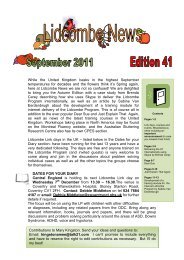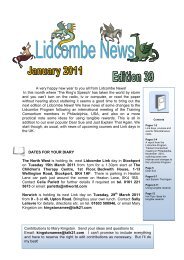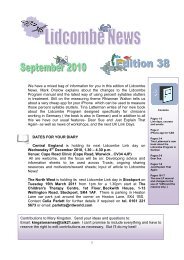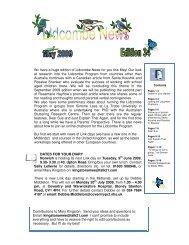Lidcombe News Edition 31st - Montreal Fluency
Lidcombe News Edition 31st - Montreal Fluency
Lidcombe News Edition 31st - Montreal Fluency
Create successful ePaper yourself
Turn your PDF publications into a flip-book with our unique Google optimized e-Paper software.
This is the third article about the introduction of the <strong>Lidcombe</strong> Program<br />
training outside of Australia, this time to Germany. Tina Latterman and her<br />
colleague Anna Hearne, are members of the <strong>Lidcombe</strong> Program Trainers<br />
Consortium, and Tina has also conducted a Randomised Controlled Trial of<br />
the programme (to be discussed in the next edition of the <strong>Lidcombe</strong> <strong>News</strong>).<br />
Introducing the <strong>Lidcombe</strong> Program to Germany –<br />
Laying foundations for something new<br />
Christina Lattermann<br />
The idea of introducing the <strong>Lidcombe</strong> Program to<br />
Germany was born in 2001 and has kept us busy ever<br />
since. At the time, Anna Hearne (nee Huber) and I were both were “Germans<br />
living in exile”. Anna was completing her PhD at the ASRC in Sydney with<br />
Mark Onslow and Ann Packman, investigating treatment for adolescents who<br />
stutter and working as a clinician. I was completing my Masters at McGill<br />
University in <strong>Montreal</strong>, where I was introduced to the <strong>Lidcombe</strong> Program by<br />
Dr. Rosalee Shenker. I had worked as a clinician for seven years in Germany<br />
before and treatments of choice for preschool children who stuttered were<br />
mainly indirect approaches or stuttering modification techniques. The<br />
<strong>Lidcombe</strong> Program definitely fascinated me as an alternative approach, in<br />
particular as it was tailored for the very young children and involved the<br />
cooperation of their parents. I was thrilled when Rosalee Shenker offered me<br />
the opportunity to learn in depth about the program and mentor me at her<br />
clinic during the course of my studies at McGill. In addition, Barry Guitar took<br />
me on for a three month internship at the University of Vermont in 2002,<br />
where I had the great fortune to work with him, Melissa Bruce and Julie<br />
Reville.<br />
After completing my Masters in March 2003, I returned to Germany and was<br />
invited by Dr. Katrin Neumann at the University of Frankfurt, Hessen, to<br />
initiate a PhD project involving the <strong>Lidcombe</strong> Program. We decided to<br />
investigate whether, in the short term, the <strong>Lidcombe</strong> Program results in<br />
reduction of stuttered speech beyond what would be expected due to natural<br />
recovery. In addition to this project, I worked in private practice exclusively<br />
treating children with the <strong>Lidcombe</strong> Program in Bavaria.<br />
After two years of intensive emailing, Anna and I met for the first time in the<br />
fall of 2003 in Germany to give our first presentation about the <strong>Lidcombe</strong><br />
Program. At this time the approach was met with overwhelming scepticism<br />
and rejection by many colleagues. This was to be expected as behavioural<br />
techniques have been considered controversial in the European “therapeutic<br />
landscape” for the last few decades. Nevertheless, we kept on presenting<br />
about the program and treating children in Germany. Towards the end of 2003<br />
the first children I treated in Hessen and in Bavaria had entered Stage II. (My<br />
sincere thanks to Anna Hearne and Rosalee Shenker for great mentoring and<br />
patient trouble-shooting all the way through!) So we were now able to present<br />
data, video clips and parental comments regarding the treatment at following<br />
conferences.<br />
11

















